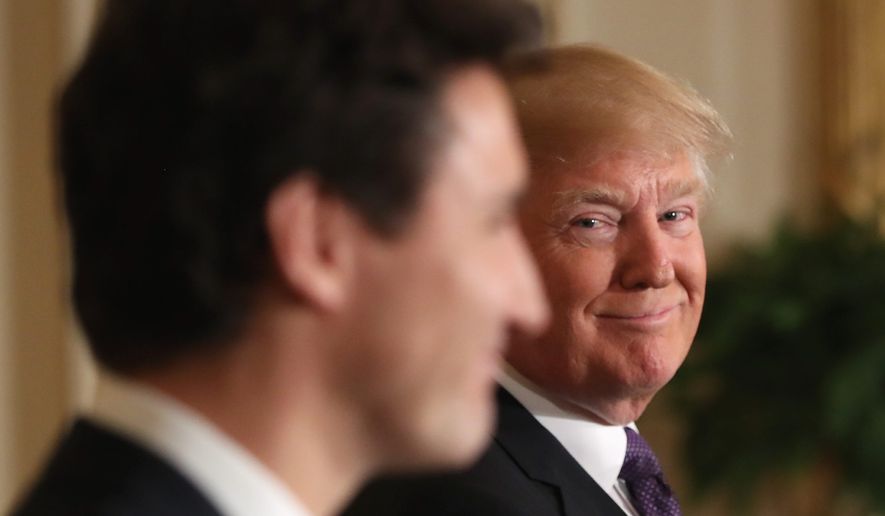President Trump gave some political cover Monday to Canadian Prime Minister Justin Trudeau during a White House visit, saying he wanted to merely “tweak” the terms of the NAFTA trade deal with American’s northern neighbor but drive a harder bargain with Mexico.
That was exactly the reassurance Mr. Trudeau needed to take home to Canada, even as he and the new American president remained on opposite sides of the debate over immigration and refugees.
Mr. Trump’s vow to renegotiate the North American Free Trade Agreement rattled Canada, which sends 75 percent of its exports to the U.S. Mr. Trudeau was looking to calm those jitters when he met America’s new president for the first time.
“We have a very outstanding trade relationship with Canada. We’ll be tweaking it,” Mr. Trump said when asked about NAFTA at a joint press conference with Mr. Trudeau. “We’ll be doing certain things that are going to benefit both of our countries.”
If Mr. Trump scraps NAFTA, some economists have suggested that the three-way agreement could be replaced by a Canada-U.S. deal, which could be an even better deal for Canada.
At the press conference, Mr. Trump said that the trade issue with Canada was “a much less severe situation than what’s taken place on the southern border.”
The president’s criticism of the 1993 trade deal between Canada, the U.S. and Mexico has focused on manufacturing jobs moved across the southern border to where wages are lower and regulations looser. He has said the deal is unfair for American workers.
“It was an extremely unfair transaction,” said Mr. Trump. “We’re going to work with Mexico. We’re going to make it a fair deal for both parties. I think that we’re going to get along very well with Mexico.”
On nearly every issue involving the three countries, Mr. Trump has more pronounced conflicts with Mexico, such as his plan to build a wall on the southern border and force Mexico to pay for it.
When asked whether he was confident in the security of the northern border, Mr. Trump said that one could “never be totally confident.” But he then redirected his comments to the administration’s efforts to deport illegal immigrants who commit crimes in the U.S., an effort geared to deporting people to Mexico and South America.
“We’re actually taking people that are criminals — very, very hardened criminals in some cases with a tremendous track record of abuse and problems — and we’re getting them out, and that’s what I said I would do,” said Mr. Trump.
Rewriting NAFTA, however, poses a real threat to Canada, which benefits disproportionately from the deal because it has the smallest economy of the three countries.
Mr. Trudeau, a staunch liberal, stressed the mutual benefits of the daily flow of $2 billion in trade between the U.S. and Canada.
“Millions of good jobs on both sides of the border depend on the smooth and easy flow of goods and services and people back and forth across our border,” he said.
Keeping the focus on middle-class jobs created by the cross-border trade, Mr. Trudeau echoed the populist message that drove both his and Mr. Trump’s election victories.
“Both President Trump and I got elected on commitments to support the middle class, to work hard for people who need a real shot at success,” he said. “We know that by working together, by ensuring the continued effect of integration of our two economies, we are going to be creating greater opportunities for middle-class Canadians and Americans now and well into the future.”
Mr. Trump and Mr. Trudeau remained at odds over immigration and refugees but managed to gloss over their disagreements, instead focusing on their common commitment to fighting terrorism and keeping their citizens safe.
Liberal activists in Canada had pressured Mr. Trudeau to confront Mr. Trump over his “extreme vetting” that halted visitors from seven majority-Muslim countries until federal courts suspended the program.
Mr. Trudeau, who responded to the policy by promising to welcome all refugees to Canada, didn’t take the bait when asked by reporters about Mr. Trump’s policies on immigration and refugee.
“The last thing Canadians expect is for me to come down and lecture another country on how they should govern themselves,” he said.
He stressed that Canada and the U.S. remain the closest of allies and have a long history of fighting side by side against common enemies from World War I and World War II to the Afghanistan War.
However, Mr. Trudeau said that he is focused on keeping his country safe while welcoming nearly 40,000 Syrian refugees in the past year.
“We continue to pursue our policies of openness towards immigration and refugees without compromising security,” he said.
Mr. Trump defended the program that targeted visitors from countries that were identified by the Obama administration as hotbeds for terrorism. He has indicated the administration would fight all the way to the Supreme Court to reinstate the program, which called for a temporary ban of the refugees to review the vetting process on the ground in those countries. He also is considering signing a new executive order to restart the program with minor changes.
“We cannot let the wrong people in, and I won’t,” said Mr. Trump. “It’s really more than toughness. It’s a stance of common sense, and we are going to pursue it vigorously.”
• S.A. Miller can be reached at smiller@washingtontimes.com.




Please read our comment policy before commenting.